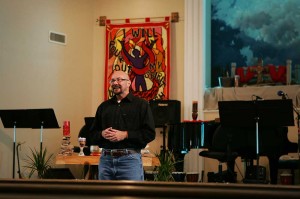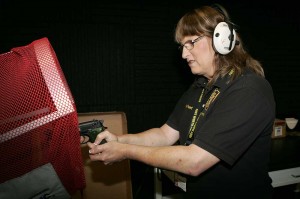Last June Time featured a statuesque TV star on its cover. The appearance of an attractive celebrity on a magazine was nothing new, of course, but this particular actress –– Laverne Cox from the acclaimed Netflix prison dramedy Orange is the New Black –– was exceptional because of her backstory.
Cox was born a male but had felt passionately since childhood that her true identity was female. Now, as an adult and a media personality, she was living as the woman she was always intended to be. The title of the Time story was also notable for the rather bold declaration in its headline: The Transgender Tipping Point: America’s Next Civil Rights Frontier.
People who identify with and present themselves as the opposite gender are not particularly shocking news anymore. From tennis star Renée Richards way back in the 1970s to Cher’s son Chaz Bono –– who was born and raised as the female Chastity Bono –– people have long been aware of, if not always comfortable with, the small percentage of the population who don’t conform to their birth sex. What’s different about Cox –– and the 2014 transgender rights movement in general –– is that she is confident, assertive, unapologetic, and unwilling to dwell on the tabloid-y medical details of her gender transition.

Moreover, she and many other trans folks are stepping up and insisting that they are a legitimate minority community in need of the same legal anti-discrimination protections as, say, women, ethnic minorities, and gay people. The reason: In cities all over America, transgender men and women experience high rates of mental illness, violence, and unhealthy lifestyles.
Fort Worth had its own “transgender tipping point” five years ago, after the local LGBT advocacy group Fairness Fort Worth began lobbying the city council to include trans people in anti-discrimination policies. This campaign followed the nationally notorious raid by police and Texas Alcoholic Beverage Commission agents on the Rainbow Lounge.
Tori Van Fleet-Kujala is a board member of Fairness Fort Worth and a transgender woman –– she began the transition in 2007 from her male birth sex to a woman, in a process that included hormone treatments and reassignment surgery. She was among those who testified before the Fort Worth City Council on the need to include trans people as a legitimate class protected by employment policies and covered by health insurance.
“It was very strange growing up, always feeling like you were living in the wrong body,” said Van-Fleet Kujala, who was born in Kansas and moved to Fort Worth in 2004. “When I mentor other trans people, I always tell them, ‘You may lose friends and loved ones [during the transition process] who don’t understand. It’s not about what you lose but what you gain along the way, what you come out on the other side as –– your real self, the self you’ve been hiding all your life.’ ”
David Mack Henderson, president of Fairness Fort Worth, is gay but not transgender. He and other local activists have taken up the cause of transgender rights, partly because trans people are the “T” in “LGBT” –– it’s a community thing –– but mostly because it’s the right thing to do. There’s a sense that, with the constant talk in the gay community about inclusiveness, the special problems and experiences of trans people have not been taken seriously even there. Recognizing their stories and extending legal protections to them as a distinct minority community are advances that have been a long time coming.
“Authenticity doesn’t always arrive in a package that’s neat, tidy, and obvious,” he said. “Sometimes you have to peel back a few layers to discover one’s true self. A person’s feelings about their gender are hardwired and sometimes quite separate from the plumbing they were born with. Fairness Fort Worth is working on building an infrastructure of support for trans people, including legal protections.”
********
Here’s a quick “Trans 101” lesson for people who want to more know about the transgender community. Technically, the term “transgender” is a broad umbrella category that applies to all those who identify and express themselves, either full time or part time, as the opposite sex. The trans community includes gay men who perform as drag queens at night while living their daily lives as men, and lesbians who very much identify as women but prefer men’s clothes simply because the style feels more natural. Any time there is some bending of traditional gender rules, the person could be considered transgender. (There’s also a term that trans people use for mainstream society, the vast majority of the population whose birth sex aligns with their gender identity: “cisgender.”)

Within the trans community are folks for whom gender identity is an utterly crucial, life-or-death matter: Since childhood, they’ve believed nature or God or fate always intended them to be the gender opposite what they were born as. Some pursue hormone treatments and surgery (if they can afford the latter or if their insurance covers it), while others don’t. But at some point in their lives, unless they begin to live 24/7 as their authentic gender identity, the disconnect between body and mind becomes intolerable.
There are trans people who live successful, professional, often married lives in Tarrant County. David Wynn, 49, is the senior pastor at Agape Metropolitan Community Church in Arlington. A transgender man, he was born in a female body in Fort Worth and, until his 30s, identified as a lesbian and was very active within MCC circles and the North Texas LGBT community.
“I think I’m fairly typical” as far as trans experiences go, he said. “I knew at a very young age, around 5, that people were interpreting me as female because of my physical body. But in my heart and mind, I related to the male experience from the start. That was the 1970s. For a long time, I tucked those feelings away. I was determined to be resilient.”
Finally, the stress of living that inauthentic female life began to damage Wynn’s personal and professional relationships. He jokes that he came out twice to his parents –– first as a lesbian, then as a man. In both instances, Mom and Dad were fully supportive. In 2003, with the help of therapists and hormone treatments, he transitioned to living full-time as a man. (Wynn declines to say whether he’s gone as far as gender reassignment surgery, considering that a private matter, as many trans people do.)
“As an MCC minister [in a woman’s body], I was always preaching to the LGBT flock about authenticity and living the life you were meant to live, regardless of what anyone thought,” he said. “It took awhile for those life lessons to sink in with me, I guess. There was a big part of me I wasn’t speaking about, and finally I had to be honest with myself and the world.”
Since he’s transitioned and taken a pastoral position at Agape MCC, Wynn has served as a mentor, on matters both spiritual and practical, to other trans people. The stories he’s heard have confirmed some of the grim realities that befall too many transgender men and women: a significantly higher propensity for depression, addiction, prostitution, suicide attempts, and homelessness.
Currently he’s mentoring a young transgender person from Dallas, someone who was born male but has identified as female since her earliest memories. She returned from her classes at a California college this summer and “came out” as transgender to parents who are, Wynn said with great delicacy, from a “conservative faith tradition.” The parents flew into a rage, disowned her, and kicked her out. She’s currently living in her car while Wynn and other advocates seek temporary housing to get her off the street.

“She’s still in shock [from the rejection],” he said. “She didn’t think her parents would be instantly supportive, but she didn’t expect they would kick her out. I see that a lot –– young transgender people who get caught up in the parents’ struggle and inability to accept them.”
Van Fleet-Kujala, 57, is a licensed forensic firearms specialist with the Fort Worth Police Department, a lab professional who examines physical evidence related to gunfire and weapons discharges at crime scenes. She was born in a male body but felt strongly from childhood that there was a disconnect between her birth sex and the female she was intended to live as. She was raised in Wichita, Kan., by a stern military father who expected his boy children to be boys and his girl children to be girls. At one point, he beat young Tori with a belt when it was discovered that the boy’s grandmother, during one play session, had dressed him up as a girl.
“He told me how much that hurt him, me dressing up as a girl,” she said. “That’s part of the reason I transitioned so late in life, I think. He passed on in 1988, and I didn’t begin hormone treatments until 2007. He’s also the reason I got into such a macho field. For the longest time, I didn’t want to disappoint him.”
While Wynn prefers not to discuss whether he’s had reassignment surgery, Van Fleet-Kujala acknowledged that she had the procedure in 2008.
Her surgery was part of the larger gender transition protocol, which starts with a diagnosis from a licensed therapist of “gender dysphoria” (described as a “strong and persistent cross-gender identification”). The treatment then segues to an extended period of counseling to prepare the individuals for living their daily lives as the opposite gender and ends with hormone treatments and, sometimes, gender reassignment surgery, which involves genital reconstruction.
Because the surgery wasn’t (and still isn’t) covered by the city health benefits, the bills drained Van Fleet-Kujala’s financial resources and forced her to file for bankruptcy.
The peace she found was worth the cost, she said. For her, not having the surgery was never an option. She felt she needed to transform her male body to complete a personal journey.
You might wonder how Tori’s transition was received in the mostly male domain of the FWPD firearms forensics lab. Shortly before she began hormone treatments, a co-worker complained to their bosses (without success) that he didn’t want to work alongside a “cross-dresser.” While Van Fleet-Kujala experienced her share of awkward moments and hostile glares, the city was, on balance, pretty supportive (as long as she paid for the transition surgery herself). They’d already had one employee go through the gender transition process, and Tori was assigned a “transition coordinator” in the Human Resources Department to try to smooth the process, for both herself and her co-workers.
“I’ve become a big proponent of trans protections in anti-discrimination policies, because at any point [before or during her transition], the city of Fort Worth could’ve fired me just for being a transgender woman,” she said. “The thing I kept squarely in my mind –– and tried to keep in my co-workers’ minds — was that I was hired to do a job, and as long I did that job to the best of my abilities, all the other stuff was fluff.”
Indeed, though Van Fleet-Kujala doesn’t consider herself a rabble-rouser, her experiences as a trans woman and a city employee did turn her into a bit of an activist. She’d never been involved with the LGBT community before 2007, but since then she’s become a trans advocate, mentor, and speaker, testifying before public and private organizations on the need for understanding and support of trans people.
********













“I knew at a very young age, around 5, that people were interpreting me as female because of my physical body. But in my heart and mind, I related to the male experience from the start.”
You go, David! Kudos for discovering your special trans male identity. As a true woman, I for one LOVE IT when people “interpret me as female” and pay me less, shame me for my body, deny me opportunities, and consider me stupid! No actual woman would prefer “the male experience” to those appropriate to the female gender. Do tell us about “the male experience,” David! Which manly pursuit do you most enjoy? Being a lady, I like wearing pink, cleaning house, and being catcalled, myself. Tee hee!